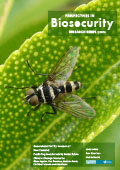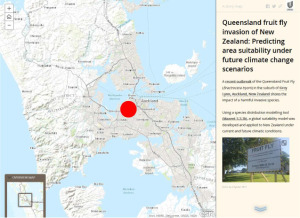 The Queensland fruit fly (Bactrocera tryoni) is a significant horticultural pest in Australia, and has also established in other parts of the Pacific. There is a significant risk to New Zealand of invasion by this species, and several recent incursions have occurred. The potential effects of climate change on the distribution and impacts of invasive species are well known. This paper uses species distribution modelling using Maxent to predict the suitability of New Zealand to the Queensland fruit fly based on known occurrences worldwide and Bioclim climatic layers. Under current climatic conditions the majority of the country was generally in the lower range, with some areas in the medium range. Suitability prediction maps under future climate change conditions in 2050 and 2070, at lower emission (RCP 2.6) and higher emission (RCP 8.5) scenarios generally show an increase in suitability in both the North and South Islands. Calculations of the shift of suitable areas show a general movement of the centroid towards the south-east, with the higher emission scenario showing a greater magnitude of movement.
The Queensland fruit fly (Bactrocera tryoni) is a significant horticultural pest in Australia, and has also established in other parts of the Pacific. There is a significant risk to New Zealand of invasion by this species, and several recent incursions have occurred. The potential effects of climate change on the distribution and impacts of invasive species are well known. This paper uses species distribution modelling using Maxent to predict the suitability of New Zealand to the Queensland fruit fly based on known occurrences worldwide and Bioclim climatic layers. Under current climatic conditions the majority of the country was generally in the lower range, with some areas in the medium range. Suitability prediction maps under future climate change conditions in 2050 and 2070, at lower emission (RCP 2.6) and higher emission (RCP 8.5) scenarios generally show an increase in suitability in both the North and South Islands. Calculations of the shift of suitable areas show a general movement of the centroid towards the south-east, with the higher emission scenario showing a greater magnitude of movement.
Click  here to read the paper
here to read the paper
Click here to visit the map
Click here to view other works by Glenn Aguilar, Dan Blanchon,
and Hamish Foote
Aguilar, G., Blanchon, D., Foote, H., Pollonais, C. & Mosee, A. (2015). Queensland fruit fly invasion of New Zealand: Predicting area suitability under future climate change scenarios. Unitec ePress Perspectives in Biosecurity Research Series (2).
https://doi.org/10.34074/pibs.rs22015
About this series:
Perspectives in Biosecurity is an occasional, multi-disciplinary electronic series of research papers and other outputs covering all aspects of the field of biosecurity, including, but not restricted to: invasion biology and ecology, invasive species identification/diagnostics, management and eradication/control, new invasive species records, modelling, biosecurity law and policy, relationships between human
society and invasive species. Papers in Perspectives in Biosecurity are primarily the results of research carried out by staff, students, graduates, associates, and collaborators of Unitec Institute of Technology. All papers are subject to a double blind peer review process. For more papers in this series please visit: www.unitec.ac.nz/epress/index.php/category/publications/epress-series/perspectives-inbiosecurity/